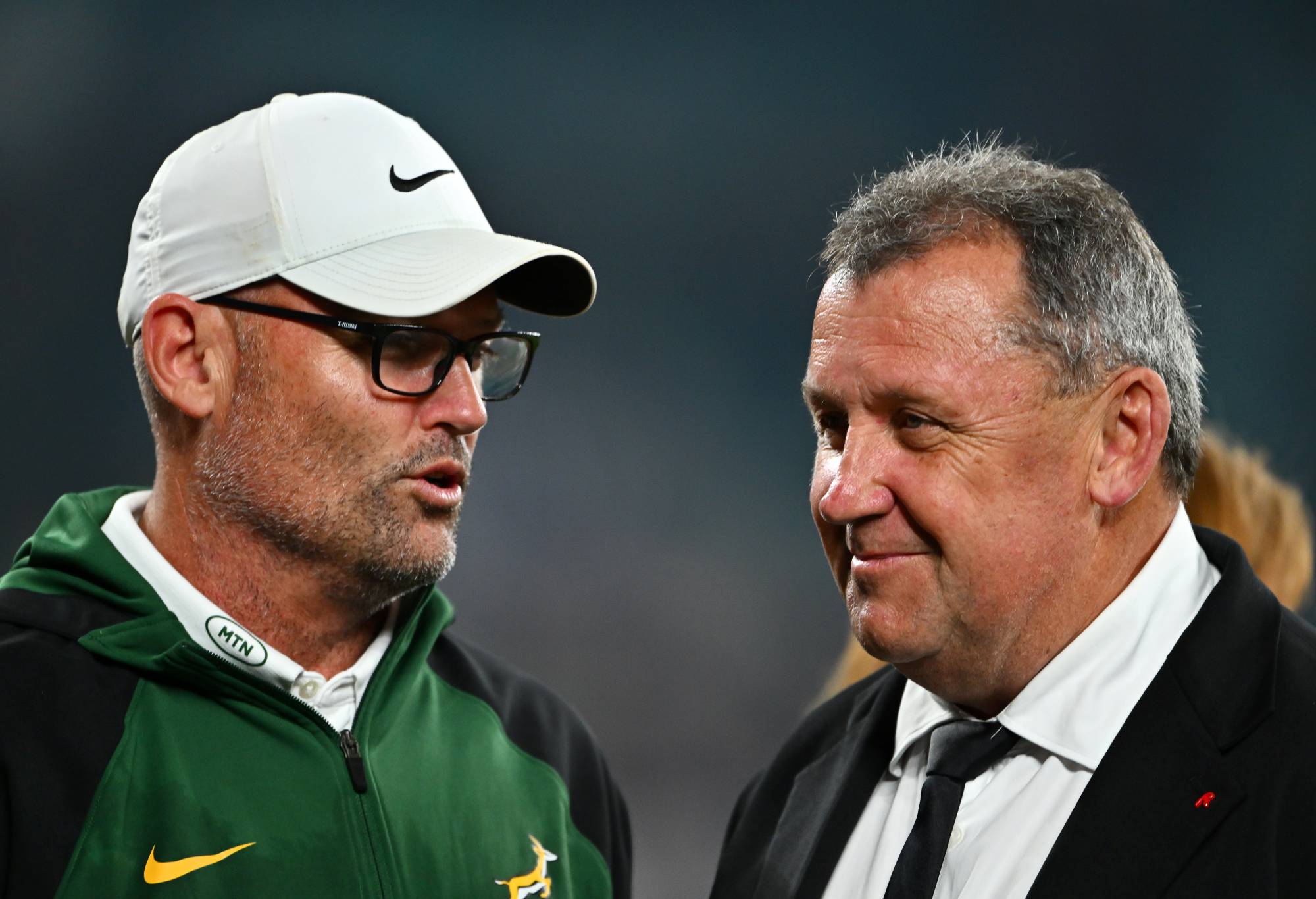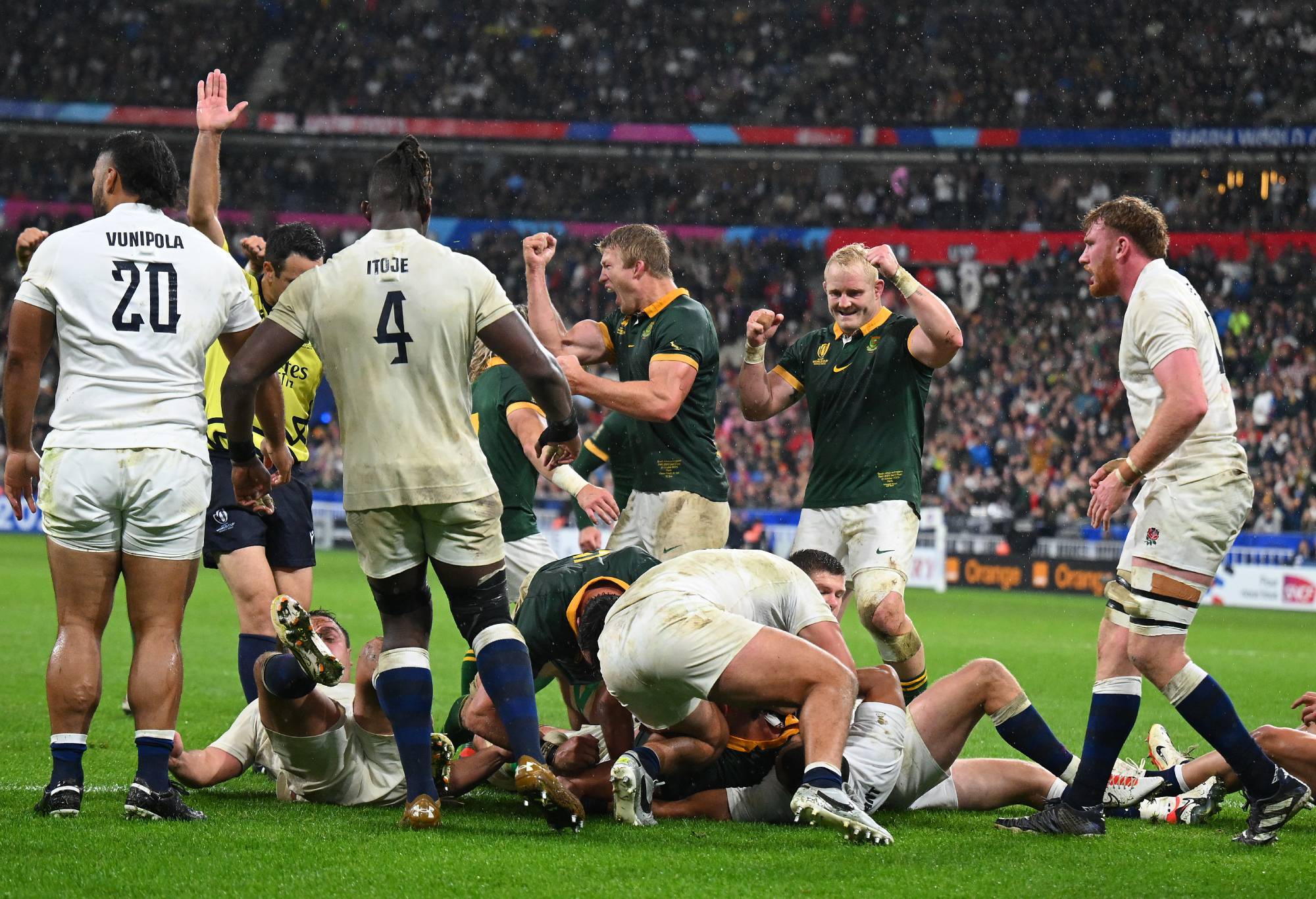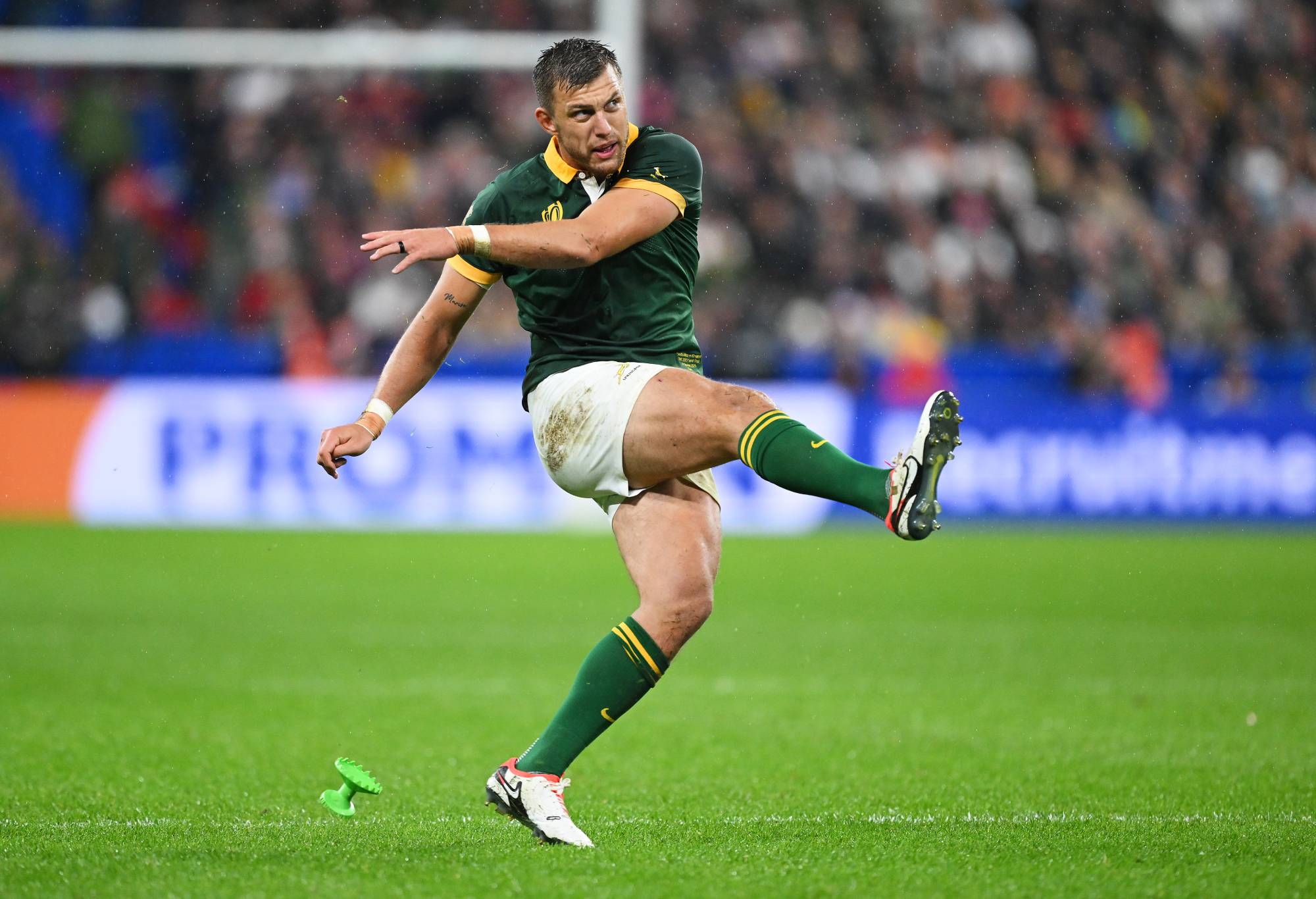PARIS – Saturday’s (Sunday, 6am AEDT) World Cup final is not just a clash between the two great powers of international rugby, it’s a clash between good and bad.
But it depends on what side of the debate you sit: whether the ends justify the means.
On one side of the debate, you have got the free-running, swashbuckling All Blacks who believe they play the game how it should be played.
Mark Telea’s turnover near his 22-metre line and the All Blacks’ desire to use the ball and counter, play with width, recycle and go again showed off their brilliant all-round game during their thumping 44-6 win over Argentina.
Then you had Will Jordan’s sublime 80-metre effort, as the winger ran onto Ardie Savea’s inside ball and chipped ahead to complete his hat-trick. It was one of seven New Zealand tries.
A week earlier, it was Richie Mo’unga slicing through the Irish defence in a piece of individual magic.
On the other side of the debate, Rassie Erasmus doesn’t care. All he wants is to win.

Jacques Nienaber’s Springboks and Ian Foster’s All Blacks will go head-to-head in the World Cup final in a clash of styles. (Photo by Dan Mullan/Getty Images)
They ground their way to victory in the semi-final over England in a one-try effort.
The five-pointer was the difference between the two sides, which came after the Springboks finished over the top of England with some set-piece dominance.
The match had few individual pieces of running rugby, with England attempting to kick their way to victory. It would have worked was it not for the Springboks’ “bomb squad”.
But Foster’s pointed reminder last month of what game World Rugby wants won’t be glossed over this week.
“Now, if you look at the South Africa-Ireland game, it was a very different game of rugby, the ball in play was 27 minutes in the whole game,” Foster noted following their massive win over Italy.
“So, a very stop-start game, very physical, very combative, whereas you saw a different spectacle tonight, and probably at some point the world’s got to decide which game they’d rather watch.”
Over the weekend, Foster seemingly found some support.
“What are you incentivising? By giving a penalty where you can take three points or kick for touch and start a maul, you are incentivising scrummaging to get the penalty. If you take that incentive away, well then what’s the incentive?” Irish-based Australian pundit Matt Williams said.
“You get the ball to the backs, you have 16 forwards tied up so there is all this space. All through the 90s and early 00s, we had wonderful back row moves and wonderful back line plays coming off scrums, it was entertaining and it was great.
“The scrums were still there and they were a contest, you could still get a pushover try, but the referee wasn’t going to give you a penalty unless you did foul play or were offside. The game was much better for it…
“South Africa and England are like great tax accountants, they find every loophole and exploit it brilliantly. I admire the intellect, but that is not good for the global game.
“It is not good for the other sides in the game like France, New Zealand, and Ireland, who are trying to play a more positive, ball in hand, entertaining game. We are in the business of entertainment…
“Is it a 15-man game or an 8-man game? Right now, it has become so biased towards scrummaging and mauling. The game is totally out of balance.”
Williams “for once” found support in his colleague, former Ireland great Rob Kearney, who agreed.
But Simon Raiwalui, the departing Fiji coach who plied his trade in Australia, Fiji, England and France, said brought a different perspective to the debate.
“One week the chat is the need to de-power the scrum, next week it’s the maul, next week it’s the ruck, key fundamentals that makes our game truly unique … do we change to suit a style/some or do we embrace what is uniquely rugby union?” Raiwalui tweeted. “I vote the latter, loved tonight’s match.”
WHO SCRUMS BEST WINS
What’s the old saying: perception is everything?
Throughout the World Cup, those with the best scrum have notoriously come out on top.
Wales smashed the Wallabies at the scrum in the second-half in Lyon and Eddie Jones’ men never recovered.
Throughout the knockout stages, with the margins tighter, the scrum has increasingly become a weapon.
Ireland was smashed at the set-piece against the All Blacks and paid the price.
France was frustrated at the set-piece and fell victim to South Africa, too.

South Africa celebrate as RG Snyman (obscured) scores the team’s first try during the Rugby World Cup France 2023 match between England and South Africa at Stade de France on October 21, 2023 in Paris, France. (Photo by Hannah Peters/Getty Images)
That theme continued in the semi-finals, with Los Pumas smoked in the area and England’s Achilles heel exposed once more after being taught a harsh lesson the World Cup final.
It leaves Foster with food for thought ahead of the World Cup final, with experienced pair Ofa Tu’unagafasi and Nepo Laulala left out against Argentina.
Unless they get set-piece parity, they won’t be able to dictate terms and play with the same freedom they crave.
Foster needs to ensure his scrum is locked down.
RWC FINALISTS AN UNCOMFORTABLE REMINDER FOR SANZAAR – AND WHY THEY WILL KEEP OPTIONS OPEN
Whoever wins the World Cup, the result will mean the past five tournaments have been won by either New Zealand or South Africa.
That tells you everything you need to know about why New Zealand Rugby are exploring avenues to play South Africa’s provincial teams more, even if that doesn’t mean a return to Super Rugby.
The physicality that South Africa provide, their supreme athletes and rugby nous is highly valued by the NZR.
It’s something they don’t want to lose.
It’s also why the NZR see Argentina as a crucial piece of the puzzle moving forward, with the South Americans featuring some of the same characteristics as their South Africans colleagues.
EXPERIENCE HAS WON OUT IN THE WORLD CUP – BUT DOES THAT MEAN EDDIE GOT IT WRONG?
After 50 minutes against Fiji, Eddie Jones dragged playmaker Carter Gordon as the game slipped away from the Wallabies.
He wasn’t the first playmaker to be subbed out and won’t be the last.
Case in point was during the second semi-final.
At the half-hour mark, the Springboks’ management acted early and decisively by withdrawing Manie Libbok – the 26-year-old Stormers fly-half.
The difference between the Springboks and the Wallabies is that Jacques Nienaber and Erasmus could call upon a World Cup winner, the vastly experienced Handre Pollard.

Handre Pollard’s clutch nature stood out against England at Stade de France on October 21, 2023 in Paris, France. (Photo by Hannah Peters/Getty Images)
Pollard, who according to prop Steven Kitshoff has “a big set of nuts on him and plays pressure situations really well”, delivered in the end by pulling two clutch kicks out of the bag.
But it was also the assuredness that he and Faf de Klerk, as well as several others, that helped the Springboks turn it around under huge adversity and an English side that was putting into the fruition the perfect game plan.
So, did Jones get it wrong?
On the surface, yes. Gordon and his back-up Ben Donaldson struggled at fly-half.
EDDIE WASN’T WRONG WITH ‘POSSESSION RUGBY IS DEAD’ COMMENT
Jones has rightly come under heavy scrutiny for his tactics and selection in 2023.
But one of his comments that “possession rugby is dead” still has some merit.
While everything the Wallabies did blew up in the faces throughout the World Cup campaign, possession has been far from everything.
The All Blacks had 30 phases against Ireland from the outset in their quarter-final and only came away with three points.
Ireland, of course had 37 at the death and couldn’t break the line.
Even France had double digit phases at the death against the Springboks but couldn’t get the territory and quick ball they craved. In stark contrast, the Springboks feast on the scraps from against Les Bleus and made them pay from turnover ball.
Ditto England against the Springboks at the death, as they spilt the ball after 11 phases as they searched for a match-winning score.
Argentina twice had double digit phase counts but could do nothing with it against the All Blacks either.
The All Blacks meanwhile cut Argentina to part from either turnover ball or set-piece play.
The issues with the Wallabies fundamentally revolved around their lack of detail, the many moving parts, composure struggles and injuries to key tight-five forwards.































































































